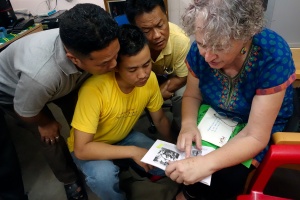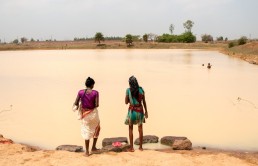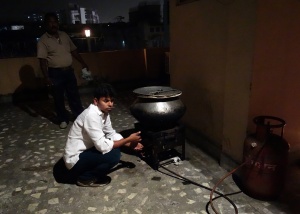Shortly after we left Kharagpur a month ago, we contacted Helen LaFave, the American Consul General in Kolkata to secure permission to explore the restricted airbase. Helen came to our talk at the Victoria Memorial Hall (the subject of a forthcoming blog post) and took me aside. “This may be more difficult than it would seem,” she said. Apparently, she had to go through the West Bengal Home Minister. When we hadn’t heard back only days before we were to leave for our 2nd trip to the area, Jerri contacted her again. It didn’t look good. But then, already in Kharagpur, we got the good news that our proposal had been approved and we could gain access to the base. We emailed our Gurkhas who were thrilled.
 On Sunday morning, we went to Salua with Asid. Pranay Rai, Bishal Tamang, and Dawa Syangbow, the three soldiers who had been most enthusiastic were distraught. They had never received any confirmation. They were rightly concerned about allowing us into the interior of the base and spending unapproved time with us. For the next half hour, we tried to contact Helen but it was Sunday, the Consulate closed, the chances of reaching her slim. After repeated calls, a security person at the Consulate answered and I explained the situation. He asked if the CG would know me by name. I told him she would, and, to my astonishment, he finally put me through. The Commander wasn’t even at the base that day—he was in Kolkata. I put Helen on with Pranay. She explained that she had gotten a text message from the Home Secretary granting permission. But protocol insisted that the soldiers needed something more substantive. Helen said that she had done as much as was possible.
On Sunday morning, we went to Salua with Asid. Pranay Rai, Bishal Tamang, and Dawa Syangbow, the three soldiers who had been most enthusiastic were distraught. They had never received any confirmation. They were rightly concerned about allowing us into the interior of the base and spending unapproved time with us. For the next half hour, we tried to contact Helen but it was Sunday, the Consulate closed, the chances of reaching her slim. After repeated calls, a security person at the Consulate answered and I explained the situation. He asked if the CG would know me by name. I told him she would, and, to my astonishment, he finally put me through. The Commander wasn’t even at the base that day—he was in Kolkata. I put Helen on with Pranay. She explained that she had gotten a text message from the Home Secretary granting permission. But protocol insisted that the soldiers needed something more substantive. Helen said that she had done as much as was possible.
We had come so close, but it looked as though we were not able to go much further. India has changed us, made us more accepting of the world around us and our place within it, more aware of the simultaneous random yet inevitable nature of existence. But that still doesn’t rule out disappointment or longing.
 Dejectedly, we all piled into our cars and Pranay and the others took us to see some sites we had missed earlier. We went first to the remains of a U.S. Army canteen, now on private property, outside the base. The owner didn’t mind us wandering about photographing. When he started making not-so-oblique references to payment, and his alcohol level became apparent, we decided to leave. But just then Pranay ran over to us, literally jumping up and down. “Sir! M’am! Something miraculous has happened!” Helen must have called in some markers behind the scenes. We had our permission.
Dejectedly, we all piled into our cars and Pranay and the others took us to see some sites we had missed earlier. We went first to the remains of a U.S. Army canteen, now on private property, outside the base. The owner didn’t mind us wandering about photographing. When he started making not-so-oblique references to payment, and his alcohol level became apparent, we decided to leave. But just then Pranay ran over to us, literally jumping up and down. “Sir! M’am! Something miraculous has happened!” Helen must have called in some markers behind the scenes. We had our permission.
It would take an hour or so for the paper work to go through, so we decided to check out a possible match to one of our two remaining unidentified temples. Someone on the base assured us that it was the same; this of course has happened before. We drove far out into the country, on vanishing roads, stopping several times to adjust our direction. Finally, our small caravan stopped, seemingly in the middle of the fields. It was noon, 100 degree heat, a blazing sun. Our temple was far off in the distance, barely visible. We walked on the small ridges between now dry rice paddies, sharp remnant stalks mixing with the brown dirt at our feet. It was absolutely quiet, except for the distant sound of barking dogs and the barely perceptible sound of heat.
There, on a small hill, next to a pond, was a little temple and what seemed to be its abandoned sister. It was similar, but not the one we were looking for. We’ve gotten used to that. It was beautiful nonetheless.
Then an old woman, shaded by an umbrella, came up to me and began speaking rapidly in Bangla. I motioned Asid, standing nearby, to help translate. Her dog was lost, somewhere out in the fields. It somehow did not occur to her than a white guy with a camera might not understand. I have arrived.












